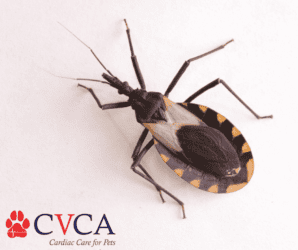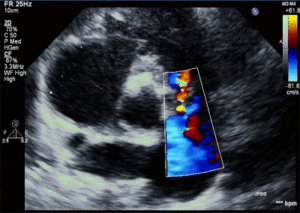Chagas Disease in Dogs
Facts about Chagas disease:
• Chagas disease affects dogs by damaging the right side of the heart.
• Dogs become infected after either getting bit by or eating a kissing bug or assassin bug.
• Both the bugs and the disease are common in Texas and Gulf Coast states, with as many as 18% of shelter dogs in Texas infected.
• The bite of the bug infects the dog with a parasite that travels in the bloodstream.
• The parasite (T. cruzi) prefers to settle in the muscle of the right side of the heart where it can cause major complications.
• Once in the heart muscle, it can cause rhythm problems, muscle weakness and poor heart function.
• In the early stages of infection, dogs feel normal.
• Over months or years, the infection damages the heart.
• Affected dogs can die from heart failure (fluid in their lungs or belly) or from sudden death.
Signs of Chagas disease in dogs can include:
• A rhythm problem found by your family vet
• Getting more tired on walks or when playing
• Weakness and/or collapse
• Bloating/swelling of the abdomen (belly)
• Fainting
• Coughing and difficulty breathing
Can I get Chagas disease from my dog?
• There are no reported cases of canine to human transmission.
• If your dog has Chagas disease, you do not need to make changes in your day to day life.
How will I know if my dog is infected?
• Concern regarding Chagas disease arises when dogs are diagnosed with serious heart rhythm problems, requiring the need for examination by a veterinary cardiologist.
• The cardiologist will diagnose the specific heart rhythm problem and perform an ultrasound of the heart—at which time a right heart enlargement or a weakened muscle could indicate the presence of the parasite.
• If the family has traveled to Texas or Gulf Coast states, a blood test called a Chagas screen and titer would be performed and, in most positive cases, would mean the patient has an active infection.
Tests needed to diagnose Chagas disease:
• An ECG to check the heart rhythm.
• A Holter monitor device the dog wears to check the heart rhythm (for more than 24 hours), gather more information about any heart rhythm problems and help guide treatment.
• An echocardiogram, which is an ultrasound of the heart that measures the heart size and function as some patients with Chagas disease start with a normal heart and get
progressively worse.
• A blood test to check for antibodies to the parasite with a positive test showing a titer of greater than 1:60.
Treatment:
• The medication for affected dogs manages the damage the parasite causes and can:
» improve the heart rhythm
» improve the strength of the heart
» decrease any fluid that builds up in the body
• There is no specific treatment to get rid of the parasite.
Outcome:
Outcomes are variable, but if the patient has fluid buildup or rhythm problems, the average is a one year survival.
Our medical staff will be happy to answer any questions you may have or discuss treatment options in more detail. Our goal is an open collaboration with your veterinarian to develop an individualized treatment plan that will provide optimal quality care for your canine family member.


